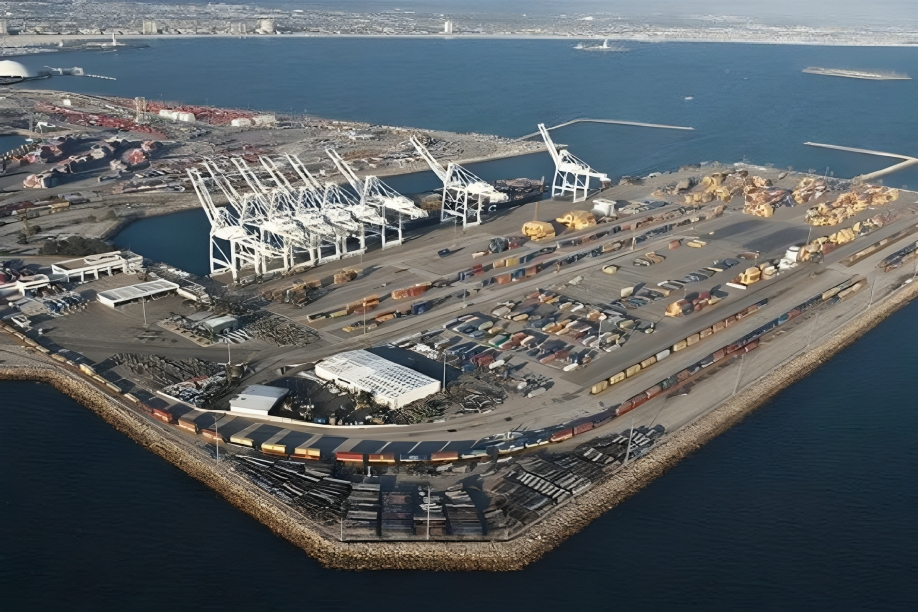Iran and India have reached a final agreement to develop Chabahar Port in southeast Iran, amid the Red Sea crisis.
Iranian Minister of Roads and Urban Development Mehrdad Bazrpash announced this, after his meeting with the visiting Indian Minister of External Affairs Subrahmanyam Jaishankar in Tehran on January 15, according to Mehr News Agency.
Bazrpash also proposed the formation of a joint transportation committee, saying that "the establishment of this committee will activate the transit capacities and utilise the North-South corridor".
After the meeting with Bazrpash, Jaishankar wrote in a post on the platform X that the two had a "detailed and productive discussion on establishing a long-term cooperation framework with respect to Chabahar port. Also exchanged views on the International North-South Transport Corridor (INSTC)".
The new long-term agreement is intended to replace the original contract, which only covers India's operations at the Shahid Beheshti terminal in Chabahar and is renewed annually. The new agreement will be valid for ten years and automatically extended.
The Chabahar Port has over 8.5 million tons of discharge and loading capacity. By linking the Chabahar transit road to the Caucasus and East European countries, Iran is introducing an alternative to the marine route through the Suez Canal. Reportedly, Iran's ports have a total capacity of more than 285 million tons per year and the country plans to increase it to 500 million tons.
India has been pushing for the Chabahar Port project to boost regional trade, especially for its connectivity to Afghanistan since 2016, when the country signed a tripartite agreement with Iran and the now Taliban-led Afghanistan to develop the terminal.
Located in Iran’s southeastern province of Sistan-Baluchistan, the Chabahar Port is seen as a key hub for the 7,200-km-long multi-mode transport project INSTC for moving freight among India, Iran, Afghanistan, Azerbaijan, Russia, Central Asia and Europe.
In a meeting with the visiting Indian minister, Iran's President Ebrahim Raisi noted the need to expedite the implementation of existing agreements between the two countries.
The president underlined the importance of key agreements including the Chabahar Port development plan, and emphasised the need to address delays in the fulfilment of commitments.
Regarding the longstanding relations between Iran and India, Raisi highlighted the importance of enhancing ties across various sectors, such as politics, economy, science and technology, transportation, and energy.
The Iranian president also stressed the necessity for joint efforts to combat terrorism and organised crime, promote stability and security in Afghanistan, strengthen international trade using national currencies, and ensure the security of shipping in international waters.
In a meeting with his Iranian counterpart Hossein Amir-Abdollahian, the Indian foreign minister described attacks on ships in the vicinity of India as a “grave concern” to the international community and maritime shipping in the region, saying that “it also has a direct bearing on India’s energy and economic interests”.
"Both of us are concerned about the recent events in West Asia, and we emphasised the importance of preventing further escalation of violence and hostilities," Jaishankar said.
India has been closely monitoring the unfolding situation in the Red Sea. The Indian Navy has already enhanced the deployment of its frontline ships and surveillance aircraft for maritime security operations in view of the maritime environment in the critical sea lanes, including the North and Central Arabian Sea.
On January 12, the US and British warplanes, ships and submarines launched dozens of air strikes on the bases of the Iran-backed Houthi forces across Yemen in retaliation for months of attacks on ships in the Red Sea that reportedly were heading to Israel, following the outbreak of the 2023 Israel-Hamas war.







 President Ilham Aliyev shed light on the evolving contours of the peace process with Armenia during an international conference in Baku this week. ...
President Ilham Aliyev shed light on the evolving contours of the peace process with Armenia during an international conference in Baku this week. ...
 Azerbaijan and Armenia started the process of demarcation of their border on Tuesday, with the installation of the first border markers based on ge...
Azerbaijan and Armenia started the process of demarcation of their border on Tuesday, with the installation of the first border markers based on ge...
 Armenian sappers commenced on Monday mine-clearance operations in the territories adjacent to the Saint Mary Church in village of Voskepar (Armenia...
Armenian sappers commenced on Monday mine-clearance operations in the territories adjacent to the Saint Mary Church in village of Voskepar (Armenia...
 Iran and Pakistan have signed eight cooperation documents in various fields, and agreed to strengthen ties to fight terrorism in the region.
Iran and Pakistan have signed eight cooperation documents in various fields, and agreed to strengthen ties to fight terrorism in the region.
 As the conflict between Ukraine and Russia escalates, the strategic importance of Kharkiv, Ukraine's second-largest city, has come sharply into focus.
As the conflict between Ukraine and Russia escalates, the strategic importance of Kharkiv, Ukraine's second-largest city, has come sharply into focus.



